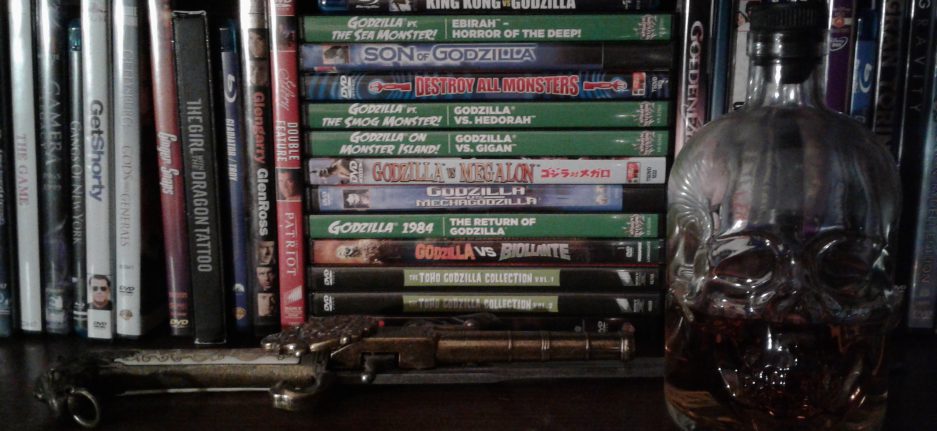I mean, I don’t kill giants. I wish. Believe you me, if giants were to come stompin’ ’bout my neck o’ the woods, I wouldn’t stand much of a chance. My best option would be to just accept the inevitable and welcome my new career as giant chow. Interestingly enough, a similar sense of the need for acceptance runs through the film I Kill Giants.

Based on the Image Comics series of the same name by Joe Kelly and J.M. Ken Niimura, the film centers on young Barbara Thorson, a girl going through some mentally anguishing times. In order to deal with her issues, she escapes into tales of giants, positioning herself as a hunter of the mammoth creatures. Sporting a headband of fuzzy bunny ears (possibly horns, it’s never really made explicit), she goes about her esoteric duties, all while her put-upon older sister tries to keep the family together, a potential new friendship arrives, a bully makes her presence constantly felt, and the school psychiatrist tries to get through to Barbara.
The basic thrust draws some strong parallels to A Monster Calls, with the inclusion of magical/fantasy elements as a concrete metaphor for Barbara’s inner turmoil. Both films deal with some fairly heavy subjects, especially when viewed through the lens of their protagonistic children, and their overall tones lean toward the darker end of the spectrum. Here, DP Rasmus Heise keeps the color palette decidedly icy, a nearly constant gloom hanging over the proceedings, mirroring Barbara’s mental state throughout. Like A Monster Calls, it’s made mostly explicit that Barbara’s the only one who can really see or interact with the giants, ensuring there’s none of that is-it-real-or-not prevarication with the audience, allowing the depth of Barbara’s delusions to really hit home.
And it’s the imaginative frankness with which this film (along with others, like A Monster Calls and Colossal) shows us a character coming to grips with crippling inner demons that resonates better than other such endeavors. Like I said about A Wrinkle in Time, such just-be-happy approaches to mental issues fail due to not only inherent ineffectiveness, but, possibly more harmfully, a strong vein of inherent condescension. Rather than talking down to the sufferer, telling them to just get over it, we see the character battle through the issue(s), fail when they need to, succeed when they need to. We are given the otherwise impossible opportunity to actually see the internal wrestling match, bruises and gashes and all, so we’re more able to sympathize and empathize with the character once the battle is over (assuming it does, indeed, end, of course). We see why and how the character changes, not just that a change happens, and we can see it comes from within. It’s a helluva lot easier to get into these stories, to identify with the portrayed battles, than it is to simply be told something’s the case one minute and that it’s solved minutes later.
A strong performance from Madison Wolfe (who’s shown up in such fare as Trumbo, Joy, and The Conjuring 2, not too shabby, eh?) as Barbara aids in this endeavor. She really gets into the roll, showing a seemingly rebellious yet troubled girl in a way that reminds me of several people I’ve known growing up (myself included, to be honest). Her performance draws you into Barbara’s world, giving you small tastes of her true situation here and there, allowing an unexpected amount of immersion before things start to really go sideways. Some solidly strong support comes from Imogen Poots’s older sister, Zoe Saldana’s psychiatrist, and Sydney Wade’s Leeds-exported friend. You’d never guess by looking at it that this would be director Anders Walter’s first feature-length effort, and, having seen it, I’m interested to see where he goes next. The aforementioned Joe Kelly adapts his own comic for the screen here, and there’s plenty of raw and sympathetic emotion to be found, something that’s often missing in screen adaptations of small, personal stories. Kelly even finds a way to cleverly work in a running reference to early 20th-century southpaw pitcher Harry Coveleski, something I definitely did not see coming, but something a baseball fan like me can easily appreciate, especially when his significance is made known.
I didn’t expect to even come across this film, but I’m glad my stumbling about yielded it up to me. It’s a strong, enjoyable film that brings the feels forth whether you like it or not, and it’s a welcome counterpoint to overblown, condescending nonsense like A Wrinkle in Time. If A Monster’s Call did it for you, this will as well, and fans of the darker versions of emotional tales will certainly find plenty to like here. I’m hoping the increasing incidence of films like these continues, ’cause I’d rather go through a harsh journey with someone than watch them dick around until they’re finally convinced to be happy and embrace the love. Depth, even if only marginal, is surprisingly welcome in an otherwise superficially-minded sea.
